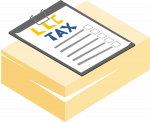Colorado LLC Taxes
Colorado LLCs, like all LLCs, are taxed as pass-through entities by default. Pass-through entities have no tax responsibilities at the company level, instead the filing requirement passes through the LLC down to the individual members. The Colorado LLC members report the LLC’s profits and losses on individual tax returns, and each LLC member will be taxed at the 15.3% federal self-employment tax rate (12.4% for social security and 2.9% for Medicare). Colorado LLC members should also expect to pay the flat Colorado income tax rate of 4.40% since Colorado’s state taxes are also passed through the company to the individuals.
In this article, we’ll cover:


How are Colorado LLCs Taxed?
By default, the IRS taxes an LLC with one owner, a single-member LLC, as a sole proprietorship, and taxes an LLC with more than one owner, a multi-member LLC as a partnership. Here are the tax forms needed for either type of LLC :
- Single-member LLC—Form 1040 (usually) Schedule C, but some file C-EZ, E, or F
- Multi-member LLC—Form 1065
Outside of the default federal taxation for LLCs, some Colorado LLCs may elect to file as an S-corp or C-corp.
Colorado LLCs taxed as S-Corp
If a Colorado LLC successfully applies to the IRS to be recognized and taxed as an S-corp, the LLC will still not be taxed at the company level and only pay individual income tax. However, the difference is that an LLC with S-corp status can make pre-tax member distributions that are not subject to the 15.3% self-employment income tax.
While S-corp status does benefit some Colorado LLCs, it’s not a guarantee. With the additional and more complicated S-corp filings, S-corp status can be more costly and time consuming for some LLCs. If you think S-corp status might benefit your Colorado LLC, first review the IRS Requirements for S-Corps and then consider speaking with a CPA.
To request S-Corp status for your Colorado LLC, file Form 2553 with the IRS. If your Colorado LLC is not yet formed or less than 70 days old, you can hire Northwest to complete your S-Corp application through initial sign up or from within your existing account. After an LLC receives S-corp status, they use Form 1120-S to report income.
Colorado LLCs taxed as C-Corp
Occasionally some Colorado LLCs choose to be taxed exactly like a corporation and elect C-corp status with the IRS. Whether a C-corp is a corporation with the default status, or an LLC that’s elected to be taxed as a C-corp, all C-corp status companies file double taxation as they have the usual individual income tax, as well as corporate taxes to pay. For most Colorado LLCs double taxation doesn’t make sense, but C-corps are eligible for corporate tax deductions and generally experience the lower federal employee income tax. If you think the C-corp status would be beneficial to your Colorado LLC, consult with a CPA to break down the numbers.
If you decide to have your LLC taxed as a C-corp, check out our guide to apply for C-Corp status, and then file Form 8832 with the IRS. When it’s time to file your federal taxes each year, you’ll use Form 1120, US Corporation Income Tax Return.

Colorado State Income Tax
Colorado LLCs are taxed by the state similar to how they are taxed federally. There is no corporate or company tax requirement for the LLC. The tax responsibility again passes through to the LLC members who pay individual flat rate state income tax. Thankfully, for the 3rd time in the last few years, Colorado’s income tax rate decreased again. Effective for the 2022 tax year, the new rate is 4.4%

Sales and Use Tax
The state sales tax in Colorado is 2.9%. Colorado cities, counties, and other tax districts also set their own, overlapping sales taxes, so the total sales tax vary widely for each area of Colorado. Use the Colorado Sales Tax Lookup tool to find a breakdown and total sales tax for any address or location in Colorado.
Colorado sales tax only applies to tangible items. Colorado LLCs that only offer services but do not make retail or wholesale sales will not need to register for or pay sales tax. For example, a business like a salon would charge and pay sales tax for selling hairspray to a client, but there would be no sales tax on a haircut.
Any business selling tangible items whether retail or wholesale must apply for the appropriate sales tax license type for their business at MyBizColorado. The most common sales tax license type is the Standard Retail Licenses, but a full explanation of each sales tax license, directions for applying, and a fee schedule is available through the Colorado Department of Revenue.

Local Colorado Taxes
On top of local sales taxes in Colorado, some Colorado cities also have a local income tax, called an Occupational Privilege Tax (OPT). In the cities that have an OPT there are two parts. The first portion is the income tax/employee responsibility, and the second is the employer’s portion of the OPT.
In Denver employees have a $5.75 OPT charge each month that is withheld by their employer, and the employer pays a business OPT of $4 each month per employee. Other cities adopted a price match model wherein employees and employers have the same monthly OPT responsibility. For example, Glendale charges employers $5/month per employee, and each employee also pays $5/month. The City of Sheridan’s monthly amount for employers and employees is $3, and the OPT charge in Greenwood Village and Aurora is $2/month for both parties.

Other Taxes in Colorado
Beyond federal, state, and local tax requirements, there are a few other taxes that your LLC may be responsible for.
Colorado State Employer Taxes
- Unemployment Insurance (UI) Tax—Percentage rates that employers pay for UI are determined annually by the state of Colorado based on factors including the amount of money already paid and unemployment benefit payments made to former employees. Most new employers start with a beginning rate of 1.7%
- Workers’ Compensation—All businesses with employees working in Colorado must have workers’ compensation insurance, regardless of how many employees they have, or how many hours those employees work. Most Colorado employers chose a commercial Worker’s Compensation Insurance provider, however some qualified companies may choose to self-insure. Generally those companies need to have over 300 employees, be in business over 5 years, and have supporting financials.
Industry Taxes
Outside of all the standard taxes based on jurisdictions, income, and sales, some industries are subject to additional, specific taxes. Industries in Colorado that have additional taxes include:
- Cigarettes, Nicotine & Tobacco Products
- Marijuana
- Liquor and Alcoholic
- Fuel
- Aviation
- Passenger Miles
- Prepaid Wireless
- Public Utilities

Do foreign LLCs in Colorado need to pay Colorado Taxes?
Yes. An LLC formed outside of Colorado but now registered in Colorado to do business should expect to pay the same taxes in Colorado as if it were a domestic Colorado LLC.





